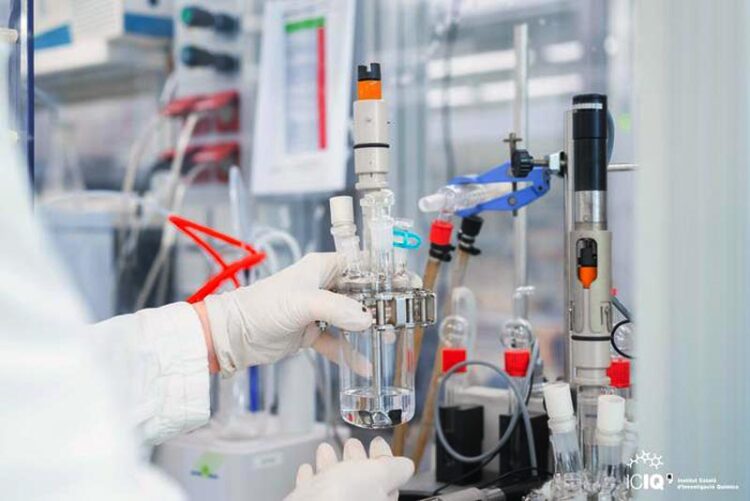Sustainable process to recycle biobased polycarbonates

ICIQ researchers describe a more sustainable process to recycle biobased polycarbonates
Credit: ICIQ
Researchers from ICIQ describe a circular process to recycle polycarbonates, a specific polymer often used in plastic applications, using less chemicals and user-friendly conditions.
A month ago, the European Union banned glitter. This action was englobed in a regulation with the aim of reducing 30% of the presence of microplastics in our environment. Waste plastics are a serious problem for our eco-systems and the push for recycling of plastics in general has gained significant attention as a potential solution.
“Circular processes for plastics represent ways to recycle chemical feedstock ideally over and over again, thereby greatly contributing to sustainability avoiding unnecessary plastic waste accumulation and possible formation of microplastics in our eco-systems”, explains Prof. Arjan W. Kleij, Group Leader at the Institute of Chemical Research of Catalonia (ICIQ-CERCA).
All plastics are mainly made from polymers, macromolecules assembled by the union of many small molecules called monomers. Like a construction game, the ideal plastic recycling process would be the controlled degradation of these polymers into smaller products and the repolymerization of them into functional plastics.
Researchers from ICIQ now describe a circular process to depolymerize and repolymerize polycarbonates, a group of plastics often used in medical applications as surgical instruments; in building and construction as an alternative for glass; and in the automobile industry to enhance vehicle efficiency by reducing weight.
The study, led by group leaders Prof. Arjan W. Kleij and Prof. Carles Bo, in collaboration with Dr. Fernando Bravo, manager of the Knowledge and Technology Transfer (KTT) department, focuses on the use of TBD (triazabicyclodecene), a multi-task catalyst, to promote this circular process for a biobased polycarbonate.
“The cycle of polycarbonate generation, degradation towards a cyclic carbonate monomer, and re-polymerization to regenerate the polycarbonate using the same catalyst both in the degradation and in the recycling, can contribute to a more sustainable circular economy, in which less chemicals are involved” indicates Dr. Fernando Bravo.
The biobased polymer used in this study is formed by monomers of limonene and carbon dioxide, with the former compound extracted from the peel of citrus fruits and available in large amounts from the food industry. Poly(limonene carbonate), shortened to PLC, has an extremely low biodegradability, but chemical degradation, like the catalytic approach presented in this collaboration, can accelerate the degradation process, making it a potentially attractive process for commercial exploitation.
This summer ICIQ presented a patent for the use of the limonene polycarbonate for adhesive and coating applications, as an alternative for oil-based materials. This polymer development is now further complemented with the present discovery, demonstrating the potential of PLC as a circular material to generate plastics that can be easily recycled under practical conditions.
This article, published in the prestigious journal “Angewandte Chemie”, is an outstanding collaboration between the experimental research done in the group of Prof. Kleij, computational work in the group of Prof. Bo, and the polymer development activities in the ICIQ KTT department, led by Dr. Bravo, that valorises industrially relevant inventions.
Prof. Bo further adds “Collaboration among interdisciplinary groups is paramount for research, as emphasized in this paper. This interplay between experiments and theory allows for the integration of diverse knowledge and approaches enabling a more comprehensive and innovative tackling of issues. Through cooperation, a deeper understanding of the challenges can be gained leading to the development of more effective solutions.”
This project has received financial support from MCIN (PID2020-112684GB-100, PID2020-112806RBI00, PDC2021-120952-I00 and CEX2019-000925-S), the Catalan Agency for Management of University and Research Grants (AGAUR 2021-SGR-00853) and “la Caixa” Foundation (LCF/PR/PR20/51150010). Alba Villar-Yanez acknowledges MCIN for a predoctoral grant (PRE2018-083947).
Journal: Angewandte Chemie
DOI: 10.1002/anie.202314659
Article Title: Bicyclic Guanidine Promoted Mechanistically Divergent Depolymerization and Recycling of a Biobased Polycarbonate
Media Contact
Marta Llorens Fons
Institute of Chemical Research of Catalonia (ICIQ)
mllorens@iciq.cat
Office: 977920200
Cell: 696631236
All latest news from the category: Process Engineering
This special field revolves around processes for modifying material properties (milling, cooling), composition (filtration, distillation) and type (oxidation, hydration).
Valuable information is available on a broad range of technologies including material separation, laser processes, measuring techniques and robot engineering in addition to testing methods and coating and materials analysis processes.
Newest articles

Energy planning in Ghana as a role model for the world
Improving the resilience of energy systems in the Global South. What criteria should we use to better plan for resilient energy systems? How do socio-economic, technical and climate change related…

Artificial blood vessels could improve heart bypass outcomes
Artificial blood vessels could improve heart bypass outcomes. 3D-printed blood vessels, which closely mimic the properties of human veins, could transform the treatment of cardiovascular diseases. Strong, flexible, gel-like tubes…

NASA’s Fermi finds new feature in brightest gamma-ray burst yet seen
In October 2022, astronomers were stunned by what was quickly dubbed the BOAT — the brightest-of-all-time gamma-ray burst (GRB). Now an international science team reports that data from NASA’s Fermi…





















